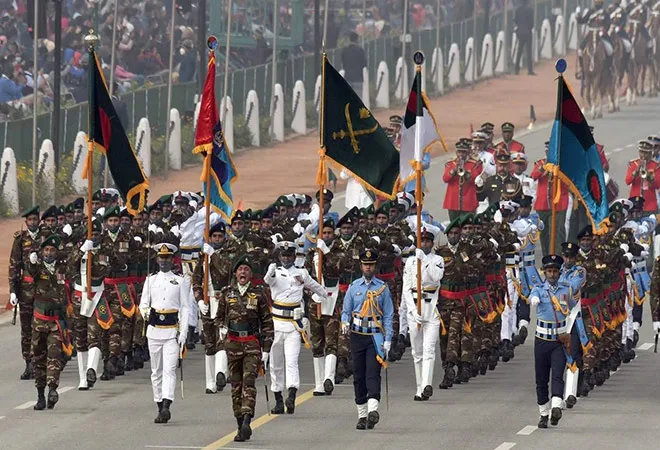
India and Bangladesh bonhomie attained a new height with the participation of the 122-member strong tri-services contingent from Bangladesh in this year’s Republic Day parade on 26th of January. The contingent was comprised of soldiers of the Bangladesh Army, sailors of the Bangladesh Navy and air warriors of the Bangladesh Air Force. Lieutenant Colonel Abu Mohammed Shahnoor of the Bangladesh army was the commander of the contingent. The Bangladesh armed forces team marched to the tune of Shono Ekti Mojibur Theke (Listen from the one Mujibur), an illustrious song that is a tribute to Sheikh Mujibur Rahman, the iconic leader of the country’s liberation, which inspired many during Bangladesh’s Liberation War in 1971. Incidentally, this year marks the centennial year of birth of Sheikh Mujibur Rahman. Notably, instances of a foreign contingent participating in India’s Republic Day parade is limited and only friendly countries are allowed to take part in this parade. Until date, three countries have taken part in the Republic Day parade. Besides Bangladesh, the two other countries that had participated in India’s Republic day parade earlier are France (2016) and the United Arab Emirates (2017). Bangladesh sending its armed forces contingent to the Republic Day parade highlights the depth of the bond and friendship between the two counties.
India and Bangladesh, the two South Asian neighbours, are tied together with the commonality of history, language and culture. The bond that makes the two relationships unique, however, has been the Liberation War of 1971. The two countries have the distinction of fighting oppression and shedding blood together during the War. India’s motivation behind participation in the war was the feeling of brotherhood and value for human dignity. During Bangladesh’s Independence movement, Pakistani forces committed inhumane torture on the freedom-loving people of Bangladesh, whose only demand was a life of dignity. Nearly three million people were martyred and hundreds of thousands of women were raped. Ten million people were forced to flee their homes and take refuge in India to escape oppression by the Pakistani army and its conduits.
Soon, Bangladesh will be celebrating the golden jubilee of its independence and this year will mark the completion of 50 years since the establishment of diplomatic relations between India and Bangladesh. Given the time in consideration, Bangladesh’s participation in the parade is momentous and special for more than one reason. Firstly, the present gesture by Bangladesh showcases a recognition of India’s contribution to the country’s Independence. Also, the present development is an assurance by the two countries to continue the spirit of friendship and feeling of unity which guided bilateral relations during the Liberation War. The present occasion is indicative of the resolve of the two countries to stand by the side of the other at the hour of need, as they did during the liberation war, and to fight challenges together for the well-being of the people of the two countries.
Additionally, it is a signal of the deep military relations between India and Bangladesh that has its foundation in the 1971 War. The Bangladesh armed forces have their roots in that war and they take pride in its glorious history. The present event is a celebration of the warmth and friendship that existed amongst the armed forces at the time of the war, and will preserve this legacy and show commitment towards promoting their ties in the future. Cooperation amongst the armed forces of the two counties has deepened over the years. The defence cooperation between the two countries include hosting of joint exercises, interactions between the senior commanders, India has provided US $500 line of credit for the purchase of arms and equipment’s, amongst others.
Generally, India and Bangladesh have maintained friendly ties in the fifty years of bilateral relations. However, there have been some instances, like the dispute over India’s construction of the Faraka barrage, that have resulted in a feeling of resentment between the two countries. Recently, India’s amendment of the Citizenship Act has led to some feeling of uneasiness. But, India and Bangladesh have never allowed such moments to linger and hamper the growth of the relationship.
It was this spirit of oneness that made India and Bangladesh the closest partners in South Asia. India and Bangladesh have been working together for the prosperity of their citizens and the people of this region for half a century. India and Bangladesh are key partners in the strengthening of regional connectivity under the BBIN (Bangladesh, Bhutan, India and Nepal quadrilateral subregional initiative) and BIMSTEC (The Bay of Bengal Initiative for Multi-Sectoral Technical and Economic Cooperation). Again, India and Bangladesh have been playing a vital role in tackling the COVID-19 pandemic that disrupted the lives of people around the world. India and Bangladesh were also one of the first to contributors to the SAARC COVID Emergency Fund. The fund was proposed by Indian Prime Minister Narendra Modi to mitigate risks associated with the COVID-19 pandemic in the region. It was this feeling of camaraderie that led India to gift Bangladesh two million doses of COVID-19 vaccines to Bangladesh.
India and Bangladesh recognise the importance of friendship and the benefits of togetherness. The present march was indicative of the two countries’ determination to cooperate for shared growth and prosperity of the people. Thus, the Bangladesh Armed Forces march during the Republic Day Parade could be termed as a march of unity.
The views expressed above belong to the author(s). ORF research and analyses now available on Telegram! Click here to access our curated content — blogs, longforms and interviews.




 PREV
PREV


